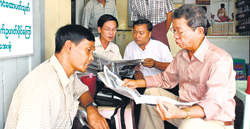
| The importance of courting a security council member NEW YORK - In international politics, a litmus test of a vibrant and enduring relationship with the world's major powers is the voting record in the Security Council. And that's the only body at the UN empowered to declare war, make peace or impose mandatory sanctions on a member state. The five veto-wielding permanent members of the Security Council -- namely, the US, Britain, France, China and Russia -- can make or break governments with the power of sanctions at their command. The economic and military sanctions imposed on Iraq after its invasion of Kuwait in August 1990 crippled the Iraqis and devastated the oil-blessed country -- virtually taking it back to the stone age.
But since the Iraqi leadership survived and prospered, the Security Council has had second thoughts about blanket sanctions on an entire country -- where the ultimate unintended victims may be the people, not the leaders. The new trend therefore is to impose "targeted sanctions" on a country's leadership, or in the case of a rebel group, its leaders or its high ranking military commanders. The US is a tried-and-tested ally of Israel because it shields the Israelis from every negative resolution the Security Council tries to pass -- whether Israel is right or wrong. And that's an enduring political relationship as reflected in Security Council voting -- year in and year out. Similarly, with the support of France, the US has also blocked a series of resolutions regarding Morocco's ongoing occupation of Western Sahara -- both from the 1970s -- which called for the unconditional withdrawal of Moroccan forces and, more recently, resolutions simply calling for an internationally-supervised referendum on the fate of the territory. China and Russia have continued to shield Sudan -- accused of war crimes and genocide -- from any Security Council sanctions because of political, economic and military interests with the sprawling African nation. As the London Economist pointed out recently: "For China not only buys about 80 percent of the oil exports that are making parts of Sudan rich. It also shields Sudan from being held to account in the UN Security Council for one of the largest atrocities of recent times: the killing of some 300,000 people and the uprooting of more than two million in Darfur." Last month, both Russia and China also came to the rescue of Myanmar (Burma) when a rare double veto by the two permanent members torpedoed a US-UK sponsored resolution criticising the military junta in Yangoon for human rights violations. Ambassador Vitaly Churkin of Russia said his country had earlier voted against the very inclusion of Myanmar on the formal agenda of the Security Council. "The Russian Federation did not believe the situation in Myanmar posed a threat to international peace and security," Churkin said. But he conceded that if there are "certain matters, including human rights", that need to be addressed, they should be done "in the proper fora" -- not the Security Council. The Chinese Ambassador Wang Guangya admitted that "there are problems in Myanamar." But he defended Myanmar by pointing out that "these problems do not constitute a threat to international peace and security" and therefore should not be within the purview of the Security Council. At a time when Sri Lanka is celebrating 50 years of diplomatic relations with China - to be commemorated by a visit to Beijing by President Mahinda Rajapaksa -- it is pertinent to find out how enduring our relationship is with China. Our diplomatic relations with Beijing goes back to 1957 although our now-famous Rubber-Rice pact dates back to 1952, five years before we established formal ties. Although we are still not on the Security Council radar screen, we are getting dangerously close to it. The complaints are not only against child soldiering by the LTTE and the Karuna Group but also against certain elements of the military accused of turning a blind eye to the recruitment of child soldiers by the LTTE's break-away group. The government has also come under intense scrutiny for human rights violations, abductions and disappearances -- all of which are being closely monitored by the UN. If Sri Lanka eventually comes under Security Council scrutiny -- and the government believes this is unjustified -- who among the big five will protect us? China? Russia? The US? And as a gesture to Sri Lanka, which of these countries would also take the initiative in backing the recommendations of the Secretary-General who, in a recent report on child soldiers, called for targeted sanctions against the LTTE leadership? But if the LTTE leadership is to be penalised, the issue of child soldiers has to go on the agenda of the Security Council. That's the dilemma that will continue to face the government. So, it has only one face saving option: publicly call for sanctions against the LTTE leadership and privately refuse to lobby the Security Council to act on it. |
|| Front
Page | News | Editorial | Columns | Sports | Plus | Financial
Times | International | Mirror | TV
Times | Funday
Times || |
| |
Copyright
2007 Wijeya
Newspapers Ltd.Colombo. Sri Lanka. |
